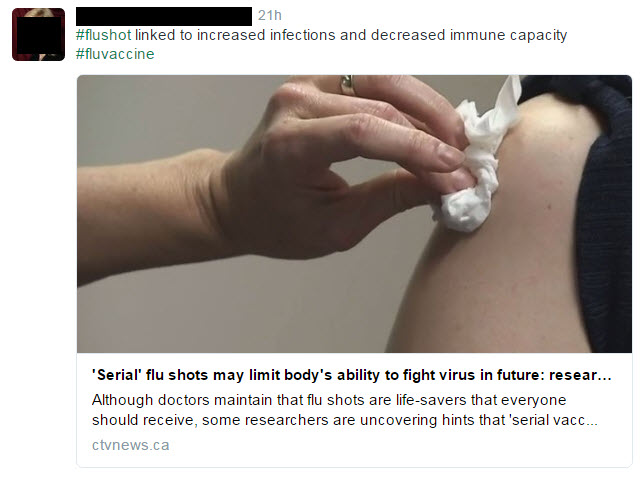Explanatory article on recent reporting on ‘serial’ flu shots causing higher flu risk
 On November 5th, CTV ran a story about new research showing that ‘serial’ flu shots may lead to reduced immunity. Although the article and video both state that more research is needed, some social media posts (often due to their brevity) implied that the findings were more conclusive.
On November 5th, CTV ran a story about new research showing that ‘serial’ flu shots may lead to reduced immunity. Although the article and video both state that more research is needed, some social media posts (often due to their brevity) implied that the findings were more conclusive.
If you receive questions from patients or staff, here is a good article that further explains the findings (and lack of conclusive evidence).
From the Intelligencer.ca:
A study released earlier this year by researchers in British Columbia reported people who received flu shots in 2012 through 2014 seemed to be at higher risk of later contracting newer strains of the virus.
But medical microbiologist Dr. Dick Zoutman, who’s chief of staff at Quinte Health Care and an infectious diseases expert, said other studies have shown the opposite. Zoutman said people still shouldn’t jump to conclusions about flu vaccines as a result of the B.C. study. He said the findings are valuable but shouldn’t be misinterpreted. “This study does not prove that serial vaccination caused lower effectiveness,” Zoutman said. “It was associated with lower effectiveness, but association is not causation.”
He said eating ice cream, by example, may be associated with higher rates of drowning. In summer, more people are swimming and, as a result, there are more drownings. But simply because more people eat ice cream in summer doesn’t mean it’s linked to another summer phenomenon.
Zoutman also said there have also been conflicting studies indicating more vaccination was beneficial. The B.C. study, he said, “raises more questions that it gives answers – and no doubt we need answers to those questions.”
[…]There have been lapses in [flu vaccine] effectiveness, especially during the 2014-2015 season, when the effectiveness of that year’s vaccine was estimated to have been less than 10 per cent. Zoutman said it still does more good than harm. “All in, it is a protective vaccine – but it isn’t nearly as effective as we need it to be,” said Zoutman.
He said early reports indicate the present vaccine is a good match for what’s expected to be the dominant form of influenza – a form known as H3N2 – when the flu season arrives in Ontario in late fall or early winter. “We’ve got a good match. Let’s take advantage of it,” Zoutman said.
Zoutman said a more effective vaccine isn’t likely to be developed soon, largely because the virus is so prone to mutation. “How do you vaccinate against something that’s mutating and changing constantly? This is the ultimate vaccine challenge,” he said.
He described influenza as “a moving target that does a lot of damage.” Health Canada reports there are one billion flu cases annually and 250,000 to 500,000 deaths. The quest for a more effective vaccine is “right up there” with the search for cures for cancer, AIDS and more common chronic diseases, said Zoutman. “I would put this in the top five to 10 of major advances in medicine that we still have yet to achieve.”
Read the full article on The Intelligencer.ca
